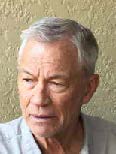Aging in Place

By Dave Trecker
It’s a tough duty getting old. You don’t walk as fast. You don’t think as fast. Sometimes you don’t think at all, or so my wife says.
You’re warned about losing your balance, but you fall down anyway. You hear a lot of baloney about your Golden Years, but after a certain age nothing gets better, not really.
Nearly 5 million Americans older than 75 have some form of dementia. Half of those over the age of 65 are arthritic. Some 13 million Americans are incontinent. There’s memory loss, neurological problems and, good grief, erectile dysfunction. (Sorry, Viagra doesn’t help much anymore.)
To complicate matters, medical advances are keeping us alive longer. By 2034, U.S. adults 65 and older will outnumber kids 18 and younger.So it’s instructive to learn how the experts say we should deal with aging. We can’t stop it, but we can ease the decline. There are some things we can do.
Exercise More: It’s a tiresome adage, but it’s still number one on the list of what helps most. Virtually all of the geriatric experts say exercise helps you live longer and live better.
And best of all, there are all kinds of ways to do it.
Nothing beats walking. Cornell’s Mark Lachs recommends structured walking programs. Some of his patients actually measure the number of steps they take each day or the minutes they spend walking.
The Wall Street Journal, in a recent aging piece, collected various recommendations, among them line dancing, aquatic classes, musical calisthenics and, for those over 80, golf several times a week.
The worst thing you can do, according to Columbia’s Keith Diaz, is to be sedentary, to sit around doing nothing, particularly after a cardio event. Diaz’s research showed that replacing 30 minutes of sedentary time with brisk walking or running lowered the risk of more heart problems by 62%.
Improve Your Diet: Here’s another no-brainer. Eat better. What’s new is the push for much more fiber, shown to lower cholesterol and keep blood-sugar levels stable.
Purdue’s Heather Eicher-Miller says adults on average should eat 2.5 cups of beans, peas and lentils a week. Other researchers say a variety of fiber-rich foods is important. For breakfast nothing beats oatmeal. A bowl of fruit is good for lunch. For an afternoon snack, popcorn is okay, but with little or no salt.
Nuts provide real value. Research has shown consuming 30 grams of nuts daily reduces the risk of cardiovascular disease and protects against Type II diabetes. Almonds are best because of their high levels of fiber and vitamins. Nuts also have a lot of antioxidants, good for scavenging those troublesome free radicals. The very best for antioxidant activity is red peanut skins.
Reduce Stress: No question, we oldsters worry more. That leads to stress and stress worsens health. To head off stress, Penn State’s Jennifer Graham-Engeland says increase your interactions with other people, join groups and participate. It makes a huge difference.
Other things help as well, among them adequate sleep and, of course, exercise and diet. Not as obvious though is hearing. Hearing loss leads to social isolation. If that’s a problem, get and use hearing aids. The technology today is quite marvelous.
Get Ready For The Future: Coming down the pike is some real Buck Rogers stuff. For example, zapping the brain with electric current mimics neural activity that, in turn, boosts memory. Or so say researchers at Boston University. Here’s a futuristic scenario: Have breakfast. Brush your teeth. Then put on an electrode-studded hat and blast away for 20 minutes.
Even more intrusive (and farther into the future) are brain implants. Though hard to believe, neurotech start-ups are experimenting with mini computer chips placed between the skull and scalp that translate brain signals into computer codes that alter neurologic activity. At this writing, over a hundred people have had implants installed.
Though now used only for medical purposes, brain implants could see wide use for stemming cognitive loss of the elderly. The WSJ reports Morgan Stanley sees a $1 billion-a-year market by 204t.
Will this put the skids on aging? Don’t scoff. It could happen.
Dr. Trecker is a chemist and retired Pfizer executive living in Naples.




Leave a Reply
Want to join the discussion?Feel free to contribute!